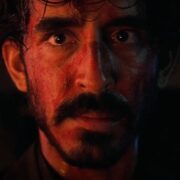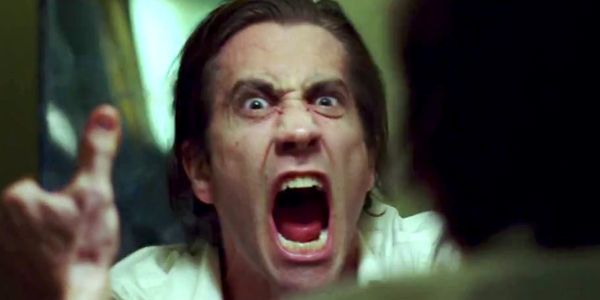NIGHTCRAWLER: A Psychological Journey
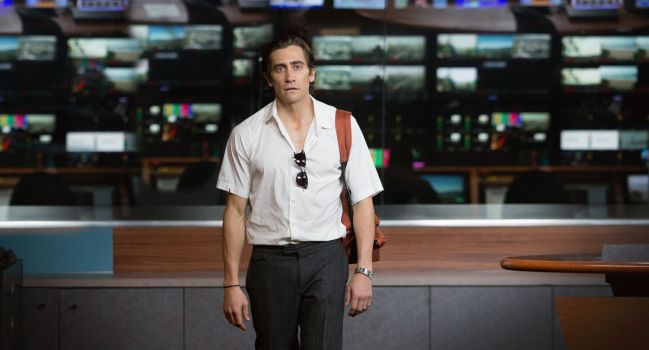
John is a Sophomore at Haverford College and a lifelong…
Nightcrawler, starring Jake Gyllenhaal, balances the crime thriller, dark comedy, and character study genres with ease. The film focuses on Louis Bloom, a mysterious young insomniac who takes to the nighttime streets of Los Angeles in an attempt to capture the most shocking breaking news. Armed with his video camera and sidekick, Rick, Louis turns real life car crashes and murders into exciting film clips to headline the morning stories. As Louis finds success by selling his footage to a local news station headed by Nina Romina (Rene Russo), he starts to take things to too far, and his disregard for the safety of others eventually triggers an intense and shocking finale.
Written and Directed by Dan Gilroy, Nightcrawler is an extremely impressive debut. At times, it feels almost like an ode to early Scorcese films like Taxi Driver and Mean Streets, but with the visual flair and style of Nicolas Refn‘s Drive. From the impeccable writing and casting to the seamless technical aspects such as lighting, framing, and editing, each component of the film is deep, subtle, and will keep you thinking about it long after you leave the theater.
You Just Don’t Understand People, Man
The engine that powers Nightcrawler is the lead character Louis Bloom. A borderline psychopath, Bloom is an unreliable, isolated, and brilliant protagonist, even though he is not particularly likable. But that’s the appeal of his character; so little is revealed about him throughout the movie and almost all of what we get occurs when he is interacting with others, all of whom show a varying level of contempt towards him. Bloom is a character that words cannot do justice for, he is somewhere between DeNiro‘s Travis Bickle and Heath Ledger‘s Joker, and each of his calculated actions speaks towards his inability to empathize and connect with others.
Jake Gyllenhaal is perfectly cast for the role. His buggy eyes, greasy hair, and quirky voice are all utilized to full effect. He also lost a considerable amount of weight for the movie which can be seen in his gaunt, haunting face as he stands over crime victims, shoving his camera at them. Gyllenhaal certainly deserves an Oscar nomination for his performance, he is given an amazingly deep and intriguing character to embody, succeeding with chilling effects.
Nightcrawler’s other great strength is its dialogue. Dan Gilroy has written for other films, including The Bourne Legacy, and here he plays with relevant and frightening concepts. The dinner scene between Louis and Nina is unforgettable because of the terrifying societal and romantic implications discussed, and Gilroy does an impressive job of utilizing such topics. Additionally, each shot is significant and meaningful. One of the film’s most striking images shows Louis leaning in towards the television, eyes wide and hungry, with the camera so close behind him that the edges of the TV screen extend beyond the frame, creating the effect that Louis has stepped into the world of the action news, and that it is his reality.
The Critical Moment
The unpredictability of Nightcrawler is both a gift and a curse. As the film reaches the final act, the tension has been built so high that the resulting climax, while intense and rememberable, seems somewhat underwhelming. The film is certainly graphic but is not saturated with violence, it instead chugs along at a slow, deliberate pace as Louis’ sadism grows. Throughout the film it seems that Nightcrawler is saving something huge for the ending. For example, two detectives are introduced towards the end, which opens up tons of exciting possibilities, but they never really do anything besides threaten Louis. The ending was definitely a good one and left a lot to discuss, but still feels lacking and not as satisfying as it should have been.
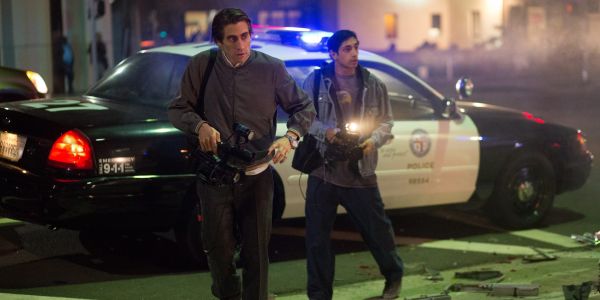
Additionally, the film starts to drag towards the end of the middle act. It falls into a repetitive cycle that feels like a routine: Louis hears of a crime or car accident, Louis rushes to the scene in his car and films the carnage, Louis heads to the news station and barters for the price of the footage, repeat. It’s a subtle complaint; Louis is an amazing character to watch on screen, and every second serves as an opportunity to collect just a little more information about him, but the film as a whole would have greatly benefitted from a little more plot development in this middle stretch.
The City Looks Great on TV
Nightcrawler is an extremely relevant film for the times. One of the main themes of this picture is how the truth is manipulated and constructed for someone’s ends. Throughout, Louis will subtly alter a crime scene; slide these family photographs next to some bullet holes, drag that dead body into the light. He is making the events more dramatic, more easily consumable. I won’t give away the ending here, but the way in which Louis’ alterations increase in scale and severity during the course of the film is shocking and deeply disturbing. Similarly, the news station itself that he sells his work to distorts the truth to preserve the image of “urban crime spills into the suburbs,” even when that is not the case.
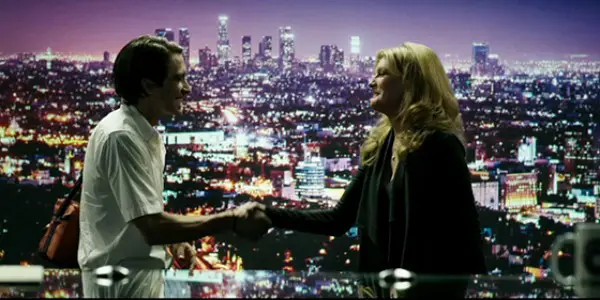
In one interaction, Louis tells Nina that “I spend all my time on my computer.” He is in one sense a manifestation of this generation; a sponge for raw information, consuming a plethora of topics with an enormous appetite, yet unable to connect with others on a fundamental, human level. He gets what he wants from people using blunt and direct language, and then ignores them, without the involvement of emotions. He makes a proposition to Nina to engage in a physical relationship, and delivers his sales pitch by highlighting how it would be mutually beneficial for them professionally. Is this a message from Gilroy that our technological and professional obsessions are leading us towards such a reality? Where we are so absorbed by careers, in getting ahead, and the constant stream of information pouring out of our smartphones, that we lose our ability to converse with people as friends (and use decent pickup lines for that matter)?
Ambitious, haunting, ironic, and mesmerizing, Nightcrawler does so many things well that its flaws are easily forgiven. It is a rare occurrence in Hollywood films when the credits role and you are totally taken off guard, both because you cannot believe what you just saw and because you have no idea how you feel about it. Gyllenhaal‘s sociopathic performance and Dan Gilroy‘s incredible source material work together to create a unique and powerful experience that will resonate into the future.
What did you think of Nightcrawler? Does Jake Gyllenhaal deserve an Oscar? What do you think it’s trying to tell us? Leave your comments below!
Does content like this matter to you?
Become a Member and support film journalism. Unlock access to all of Film Inquiry`s great articles. Join a community of like-minded readers who are passionate about cinema - get access to our private members Network, give back to independent filmmakers, and more.
John is a Sophomore at Haverford College and a lifelong movie fan. He plans to major in English with a Film Studies minor, and loves watching, analyzing, and writing about films.












